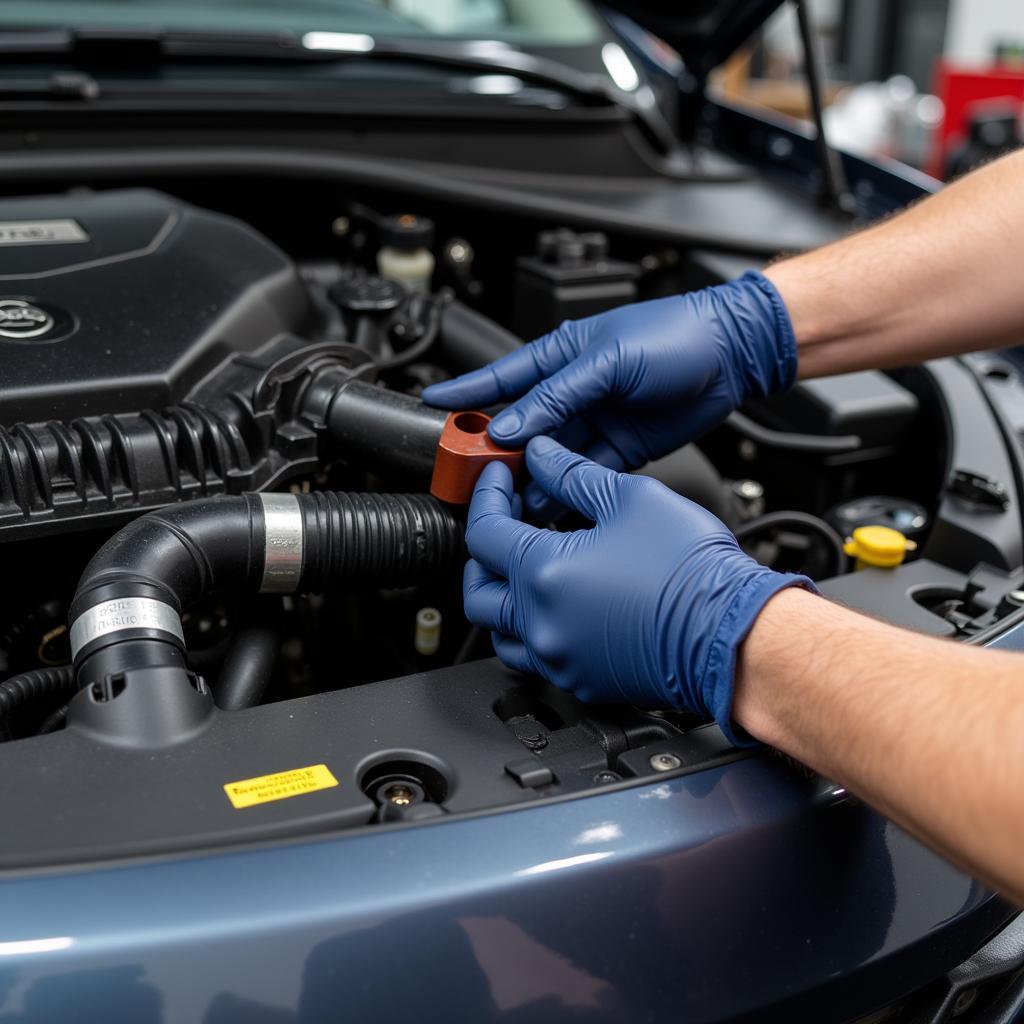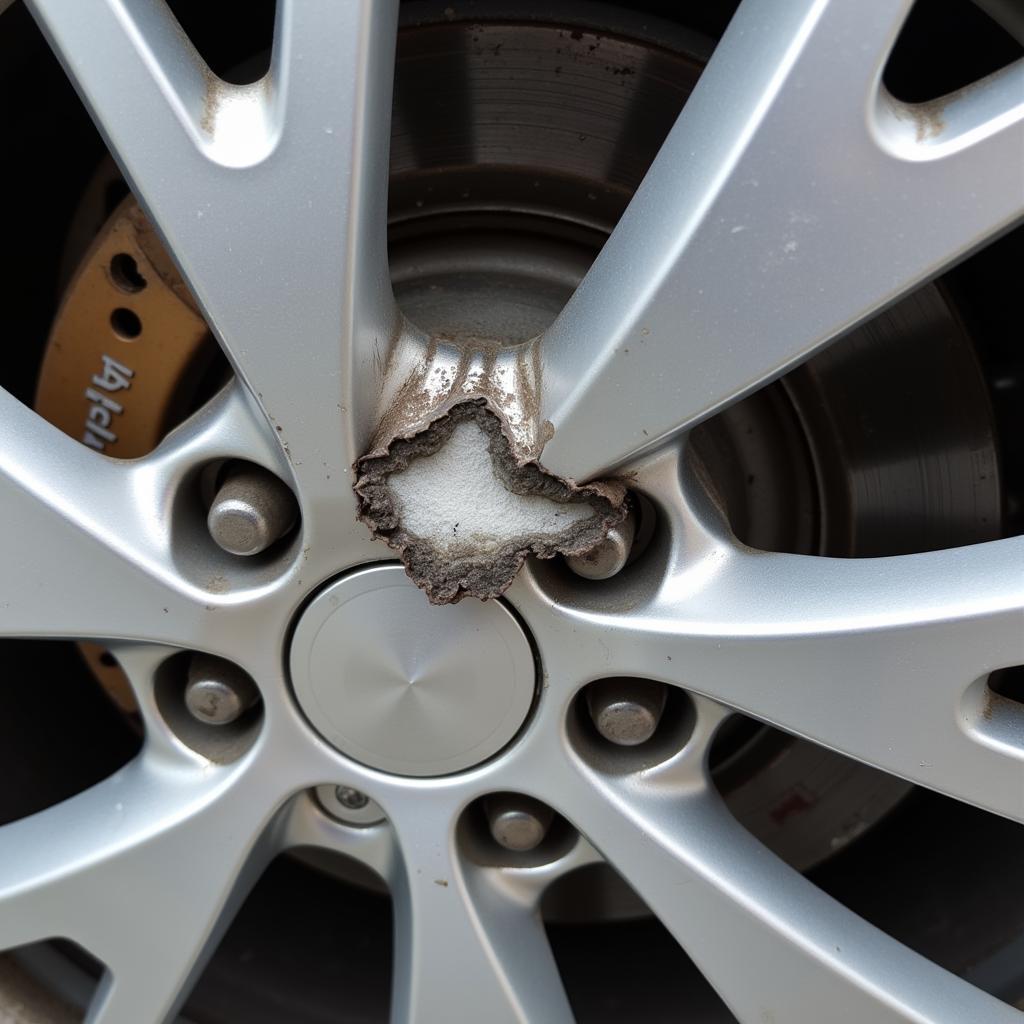You step into your car on a sweltering summer day, crank up the AC, and…nothing. Or worse, lukewarm air weakly puffs out of the vents. A car freon leak is a common culprit for this uncomfortable situation. But don’t sweat it just yet! The good news is that yes, a car freon leak can be fixed. Let’s dive into the details of how to diagnose, repair, and even prevent these leaks.
 Car AC Freon Leak Detection
Car AC Freon Leak Detection
Understanding Freon and its Importance
First things first, let’s demystify what “freon” actually is. Freon is a refrigerant, a substance that absorbs heat from the inside of your car and releases it outside. This process is what keeps your car cool and comfortable, even on the hottest days. Technically, “Freon” is a brand name, but it’s often used generically to refer to the refrigerant in your car’s AC system.
A freon leak means this vital cooling agent is escaping, leading to a less-than-optimal (or completely non-existent) cooling experience.
Signs Your Car Might Have a Freon Leak
How do you know if your car is suffering from a freon leak? Here are some telltale signs:
- Warm air blowing from the vents: This is the most obvious symptom. If your AC is blowing warm instead of cold air, a freon leak is a strong possibility.
- A hissing or bubbling sound: This indicates that refrigerant is escaping from the system.
- An oily residue near AC components: Freon leaks often leave behind a greasy residue.
- The AC takes longer to cool than usual: If your system is low on refrigerant, it will take longer to cool your car.
Why Fixing a Freon Leak is Crucial
Ignoring a freon leak isn’t just about enduring an uncomfortable ride. Here’s why it’s important to address the issue promptly:
- Environmental impact: Freon is a harmful greenhouse gas. A leak releases it into the atmosphere, contributing to environmental damage.
- Costly repairs: A small leak can worsen over time, leading to more expensive repairs down the line. Additionally, running your AC with low refrigerant can strain the system and potentially damage other components.
- Health risks: While not common, prolonged exposure to high concentrations of freon can pose health risks.
Can You Fix a Car Freon Leak Yourself?
While some car maintenance tasks are DIY-friendly, fixing a freon leak is best left to the professionals. Here’s why:
- Specialized tools and knowledge: Repairing a freon leak requires specialized tools and equipment, along with knowledge of the AC system’s intricate workings.
- Safety concerns: Refrigerants are hazardous materials and should only be handled by trained technicians.
- Legal requirements: In many areas, it’s illegal to handle refrigerants without proper certification.
how to fix a freon leak in a car
What to Expect When You Take Your Car In
When you take your car to a certified mechanic for a freon leak, here’s what they’ll typically do:
- Inspection: The mechanic will first inspect your AC system for leaks using a leak detection system. This might involve injecting a fluorescent dye into the system or using an electronic leak detector.
- Repair: Once the leak is located, the mechanic will repair it. This could involve replacing a leaking hose, o-ring, seal, or even a faulty component like the evaporator or condenser.
- Evacuation and Recharge: After the repair, the mechanic will evacuate the system to remove any air and moisture, then recharge it with the correct type and amount of refrigerant.
Preventing Future Freon Leaks
While some leaks are unavoidable due to wear and tear, here are some preventative measures to keep in mind:
- Regular AC Service: Just like any other car system, regular maintenance is key. Have your AC system inspected and serviced at least once a year, preferably before the start of the hot season.
- Visual Inspections: Periodically, open your hood and visually inspect the AC components for any signs of damage, leaks, or corrosion.
- Careful Cleaning: When cleaning your engine bay, be cautious around the AC components. Avoid using harsh chemicals or high-pressure washers that can damage seals and connections.
Expert Insight
“One of the most common misconceptions I encounter is that a little freon leak is no big deal,” says John Smith, a certified automotive HVAC technician with over 20 years of experience. “But even a small leak can lead to major problems down the road. It’s always best to address the issue as soon as you notice it.”
Conclusion
A car freon leak might be a common problem, but it’s not one to be ignored. Addressing it promptly protects the environment, your wallet, and ensures a comfortable ride, even on the hottest days. Remember, leave the repairs to the professionals with the expertise and equipment to handle this complex system safely and effectively.
If you suspect your car might have a freon leak, don’t hesitate to contact AutoTipPro at +1 (641) 206-8880. Our team of certified technicians at our San Antonio office (located at 500 N St Mary’s St, San Antonio, TX 78205, United States) is here to diagnose and fix the problem, keeping your car cool and your ride comfortable.
FAQs
1. How much does it cost to fix a freon leak?
The cost varies depending on the severity and location of the leak, but it typically ranges from $150 to $800.
2. How often should I recharge my car’s AC?
Ideally, you shouldn’t need to recharge your AC system more than once every few years. If it requires frequent recharging, it likely has a leak.
3. Can I use any type of refrigerant in my car?
No. Different cars use different types of refrigerants. Using the wrong type can damage your AC system.
4. What is a leak detection system?
It’s a specialized tool used to pinpoint the exact location of a freon leak in your car’s AC system.
5. How long does it take to fix a freon leak?
The repair time varies depending on the complexity of the leak, but it can typically be done within a few hours.






Leave a Reply